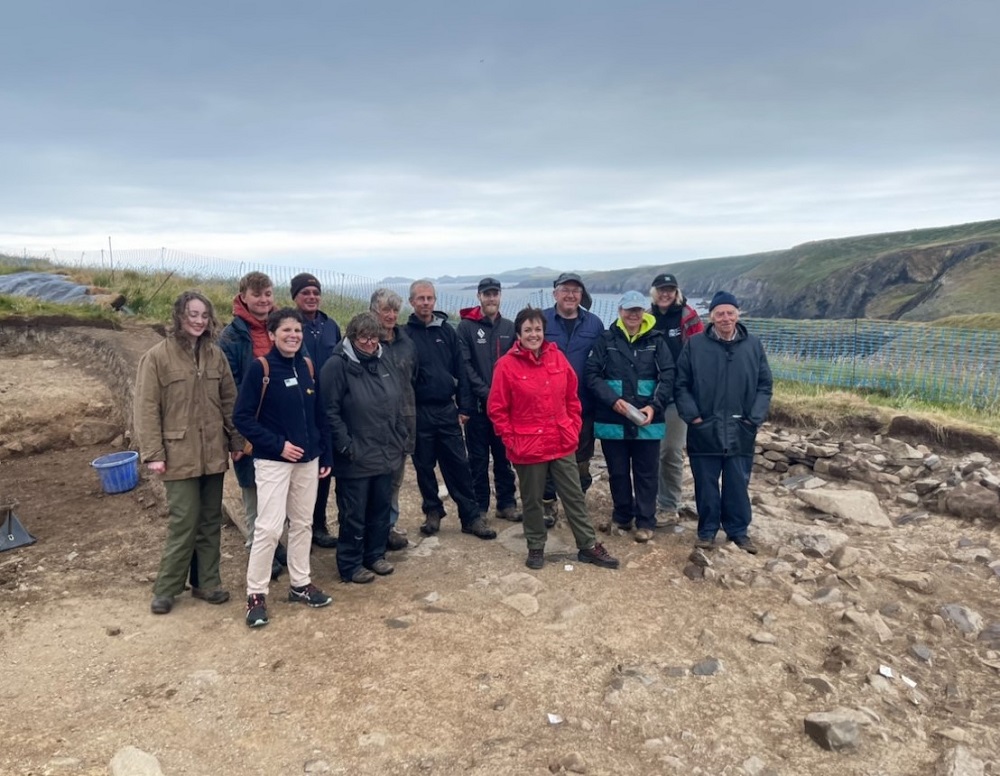Pembrokeshire archaeological team in race to excavate a site before it is lost to the sea

A team of archaeologists in Pembrokeshire are facing a race against time to excavate a site there before it is lost to the sea.
Dyfed Archaeological Trust are leading a team at Porth y Rhaw, St Davids to learn more about the site which will soon cease to exist due to coastal erosion.
This year the excavation is concentrating on excavating a large stone-built roundhouse. Finds, including pottery and a blue glass bead, show that this house was lived in in the Roman Period.
Ken Murphy of Dyfed Archaeological Trust, said: “Porth y Rhaw fort is an important site which can tell us a lot about life in Iron Age and Roman Pembrokeshire. Previous work has shown us that the fort may have been used for over a thousand years. Its interior contains the remains of prehistoric roundhouses, some of which had been re-built several times.
“Porth y Rhaw is suffering from active coastal erosion, much of it has already been lost to the sea, and this will only get more severe as we feel the increasing impacts of climate change. It’s essential that we recover as much information as possible before work on the site becomes too dangerous.”
Climate change
The site, which has received funding from Cadw, the National Trust and the Nineveh Trust, was visited by the Deputy Minister for Arts and Sport, Dawn Bowden today.
This is the third season of community excavation, and the funding from Cadw, the National Trust and the Nineveh Trust, with support from the Pembrokeshire Coast National Park – along with help from an enthusiastic team of volunteers– is allowing the Trust to recover irreplaceable archaeological objects and information before they are lost to the sea.
Excavation and the recovery of evidence is just one strand of adaptation to climate change; something which the entire historic environment sector is currently working on.
To help raise awareness of the risks and opportunities of climate change and the need for adaptation, the climate change subgroup of the Historic Environment Group (HEG) has published the Historic Environment and Climate Change in Wales Sector Adaptation Plan.
‘Historic assets’
The Deputy Minister, Dawn Bowden said that the loss of the site was an example of the way that Wales is already experiencing the effects of the changing climate.
“Warmer temperatures, rising sea levels, changing rainfall patterns and more frequent extreme weather events are now familiar,” she said.
“The impact of these effects on our historic assets, which are irreplaceable, will have significant consequences for the historic environment as a whole as well as the people of Wales.
“We need to take action now to improve our knowledge and understanding of the threats and opportunities for the historic environment, and to increase our capacity and resilience to adapt and respond to the risks.
“This amazing site has revealed evidence of 1000 years of occupation, and it really is a race against time and the elements to obtain as much information as we can about the site – which tells us a fascinating story of our ancestors.
“I was also delighted to meet the volunteers working with the trust who have experienced substantial benefits to their own wellbeing as well as contributing to the project.”
Support our Nation today
For the price of a cup of coffee a month you can help us create an independent, not-for-profit, national news service for the people of Wales, by the people of Wales.






